Feng shui offers a way to make guest rooms welcoming and peaceful. The bedroom is key in feng shui, as it affects how well we rest. By using feng shui, homeowners can create a space that feels cozy and calm for their guests.
Key Takeaways
- Feng shui guest room design focuses on balanced energy flow and creating a soothing ambiance.
- Proper bed positioning, decluttering, and the use of calming colors are essential for a welcoming guest room.
- Incorporating natural elements and avoiding disruptive items can help maintain a harmonious space.
- Thoughtful lighting and decor selection can contribute to the overall guest room experience.
- Understanding and applying feng shui principles can transform a guest room into a haven of relaxation and comfort.
Understanding the Basics of Guest Room Feng Shui
Creating a guest room with Feng Shui in mind is key for a welcoming space. The five elements – wood, fire, earth, metal, and water – are vital. Each element brings its own energy and qualities.
The Five Elements in Guest Room Design
Using the right mix of these elements can make your guest room peaceful and refreshing. For instance, wood elements like plants boost creativity. Water features bring calm and spirituality.
Energy Flow Principles
Energy flow is also crucial. Clear paths and smart furniture placement improve energy flow. This lets positive energy move freely.
Creating Balance and Harmony
The goal is to achieve balance and harmony in your guest room. This means using symmetry, neutral colors, and natural materials. It creates a calm and soothing space for your guests.
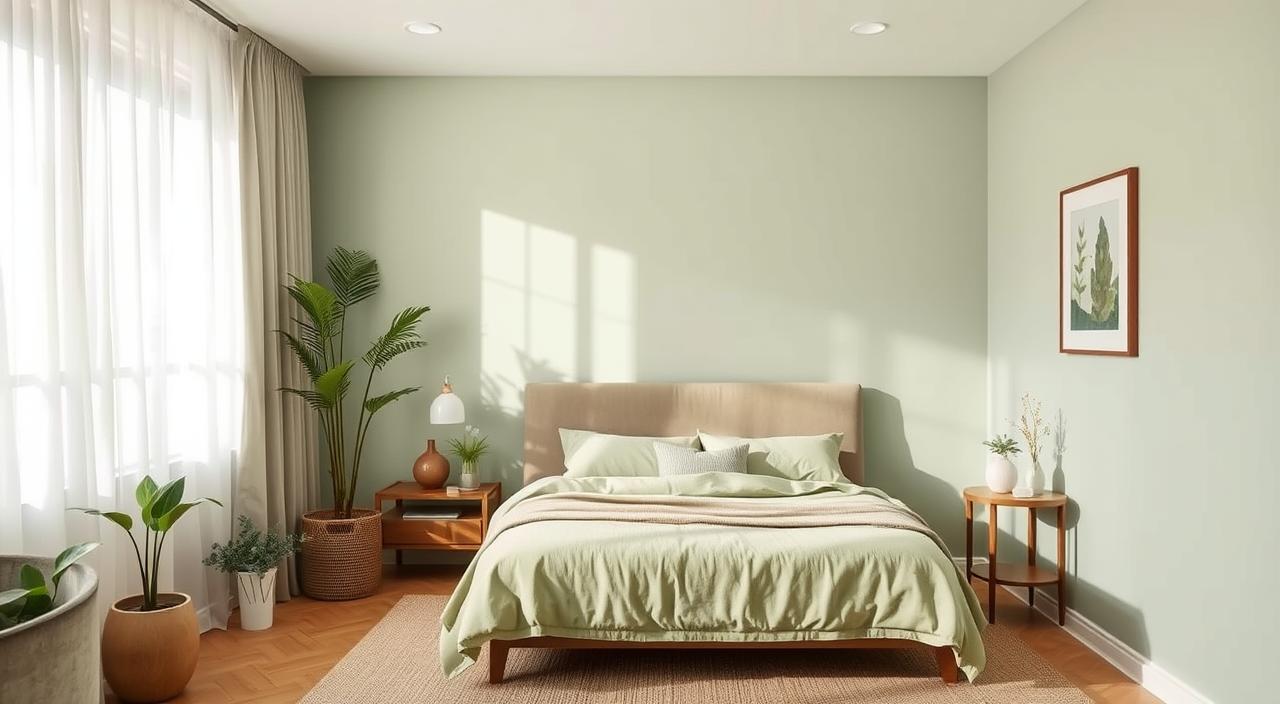
“Feng Shui is the art of placement, the way we arrange the spaces we live in order to create harmony, balance, and positive energy flow.”
Optimal Guest Room Layout and Positioning
Creating a welcoming guest room involves careful layout and positioning. Feng Shui experts say the room’s placement in the home affects energy flow and guest experience.
Positioning the guest room away from the main entrance is key. This ensures positive energy flow, making guests feel private and secure. Licensed spiritual realtors agree, saying it boosts guests’ comfort and well-being.
For natural light, choose a room with plenty of windows. This improves energy flow, making the room more inviting. The room’s spot in the bagua map also affects decor choices that can enhance the guest experience.
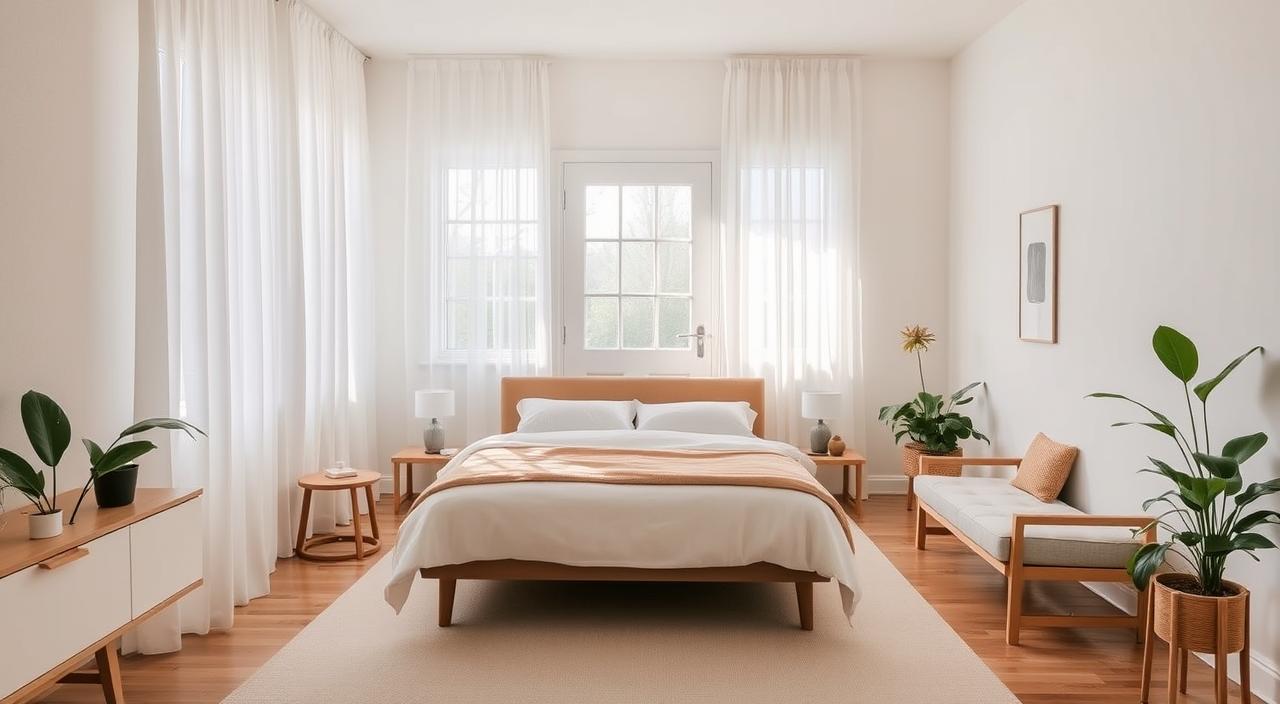
Designers suggest using wood and fire in the love segment of the bagua map to strengthen relationships. Wood elements and plants in the health segment boost well-being. Knowing the room’s energy dynamics helps create a welcoming space for guests.
Feng Shui experts also advise against clutter in guest rooms. Keep them inviting, clutter-free, and comfortable. A separate bathroom for guests adds to their privacy and comfort.
By applying Feng Shui principles, homeowners can make their guest rooms welcoming and comfortable. This ensures a positive experience for all guests.
Essential Guest Room Bed Placement Tips
Creating a welcoming guest room begins with the bed’s placement. Feng Shui says the bed is key, affecting energy flow and comfort. It’s all about balance and harmony.
Choosing the Right Bed Size
Start by picking a bed that fits the room well. It should leave enough space for guests to move easily. Choose the biggest bed that still feels cozy, helping chi energy flow smoothly.
Headboard Selection and Positioning
The headboard is important in Feng Shui. Go for a sturdy one that adds stability. Place the bed against a solid wall, away from windows and doors. This keeps energy flowing right.
Bedding Materials and Colors
Use natural materials like bamboo or cotton for bedding. They make the room calm and peaceful. For colors, stick to neutrals like beiges and earth tones. They help guests relax and sleep well.
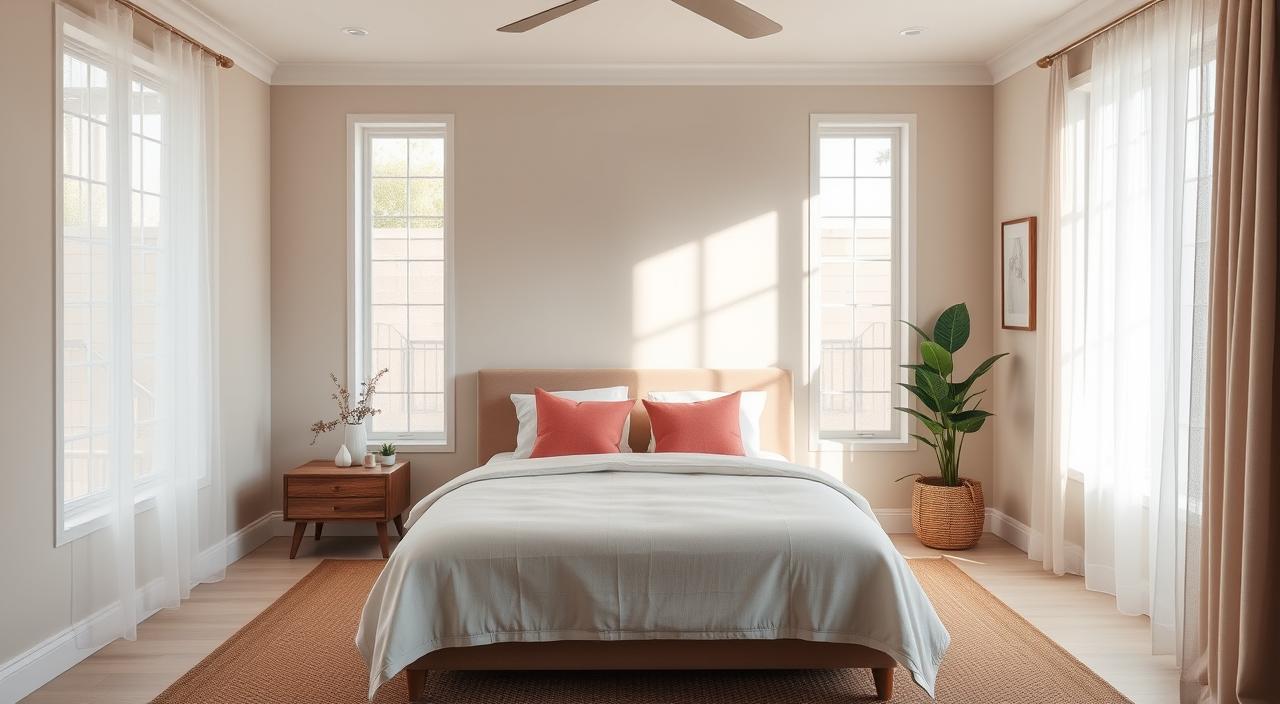
“A well-chosen bed and its placement can transform a guest room into a sanctuary of tranquility and rejuvenation.”
Think about bed size, headboard, and bedding carefully. This way, your guest room will be a haven of peace and rest for your visitors.
Color Psychology in Feng Shui Guest Room Design
Creating the perfect feng shui guest room is more than just arranging furniture. Color psychology is key to making the space welcoming. Neutral colors like soft beiges and warm tans help guests relax. Nature-inspired colors, such as pale blues and dusty pinks, also add to the calm.
But, avoid bright colors that might keep guests awake. Dark colors can make the room feel heavy. Instead, choose a mix of yin and yang colors for a balanced feel.
“The right feng shui colors can transform a guest room into a haven of relaxation and harmony.”
Here are some tips for picking feng shui colors:
- Soft colors like blues and greens help guests relax.
- Warm neutrals like beiges and tans make the room feel welcoming.
- Adding a pop of color can brighten the space without overwhelming it.
- Steer clear of bright, intense, or dark colors that can disrupt the mood.
By using color psychology in your feng shui guest room design, you make a space that’s not just pretty. It’s also a place where guests can unwind and feel at ease.
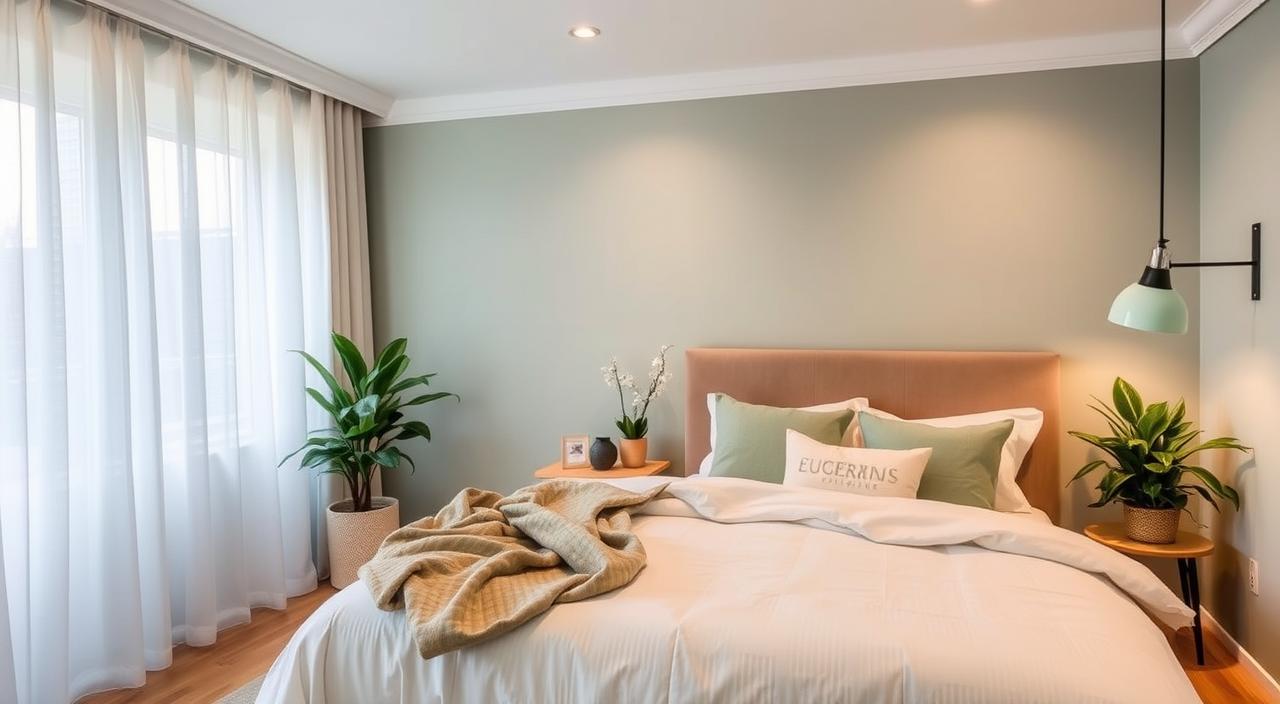
Feng Shui Guest Room: Welcoming and Harmonious Space
Creating a guest room that feels welcoming and balanced is key in Feng Shui. By applying the principles of Yin and Yang, you can make your guest room a peaceful place. It will be ready to welcome your visitors with open arms.
Creating Positive Energy Flow
To ensure positive energy, keep your guest room tidy and organized. Remove any items you don’t need. This lets the energy move freely. A clean room feels more inviting and relaxing for your guests.
Balancing Yin and Yang Elements
Feng Shui teaches us to balance Yin (passive) and Yang (active) in our spaces. In the guest room, mix soft textures like plush bedding with sturdy furniture. This balance brings comfort and peace, helping the room’s positive energy flow.
Using natural and soft artificial light is also important. Natural light brightens the room during the day. In the evening, lamps or sconces add a warm glow.
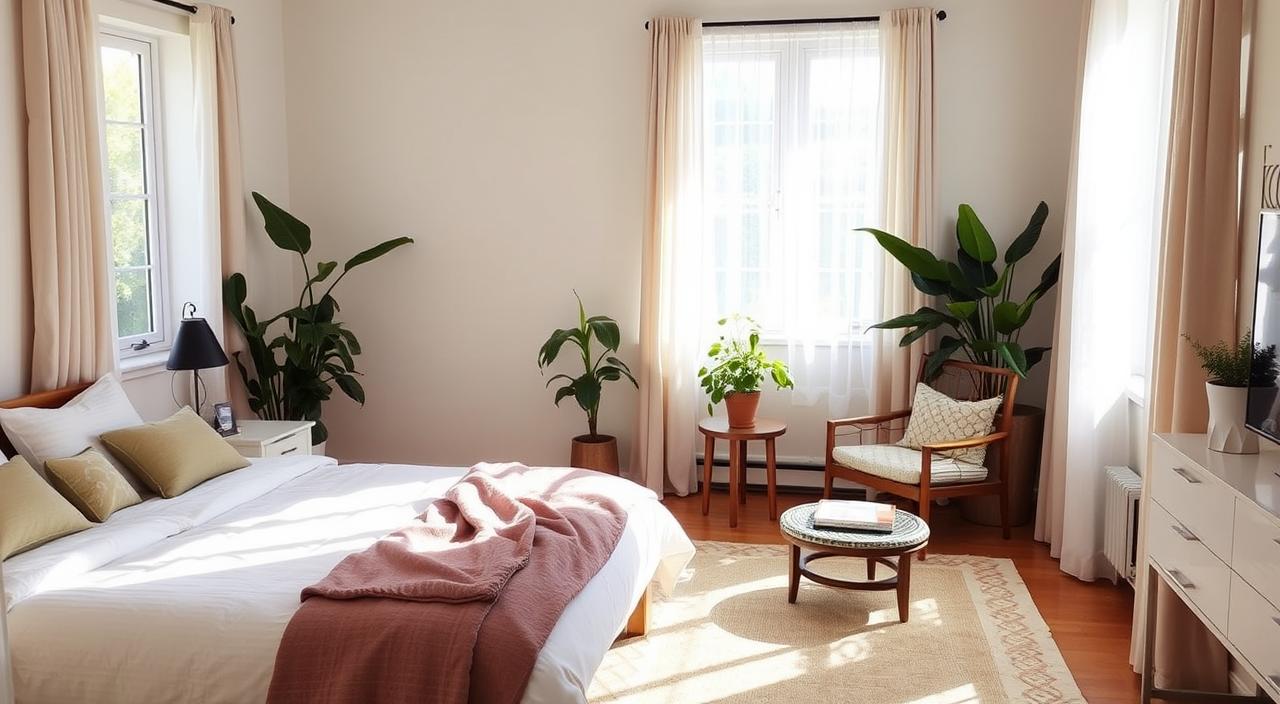
“The guest room should be a sanctuary where your visitors can feel at ease and rejuvenated. By leveraging Feng Shui principles, you can create a space that radiates yin and yang balance and fosters a sense of comfort and well-being.”
Lighting Elements and Natural Light Integration
Feng shui is an ancient Chinese art that focuses on harmonizing spaces. It highlights the role of lighting in guest room design. By using feng shui lighting and natural light, you can make your guest room welcoming and nurturing.
Integrating natural light is a key principle in feng shui. Windows or skylights bring in sunlight, brightening the space. This sunlight also brings positivity and rejuvenation. Use light, airy curtains to let sunlight in while keeping privacy.
It’s also important to add warm and soft artificial lighting. Dimmable fixtures and sconces create a cozy feel. You can adjust the lighting for different moods and activities. Avoid harsh overhead lighting to prevent disrupting sleep and energy flow.
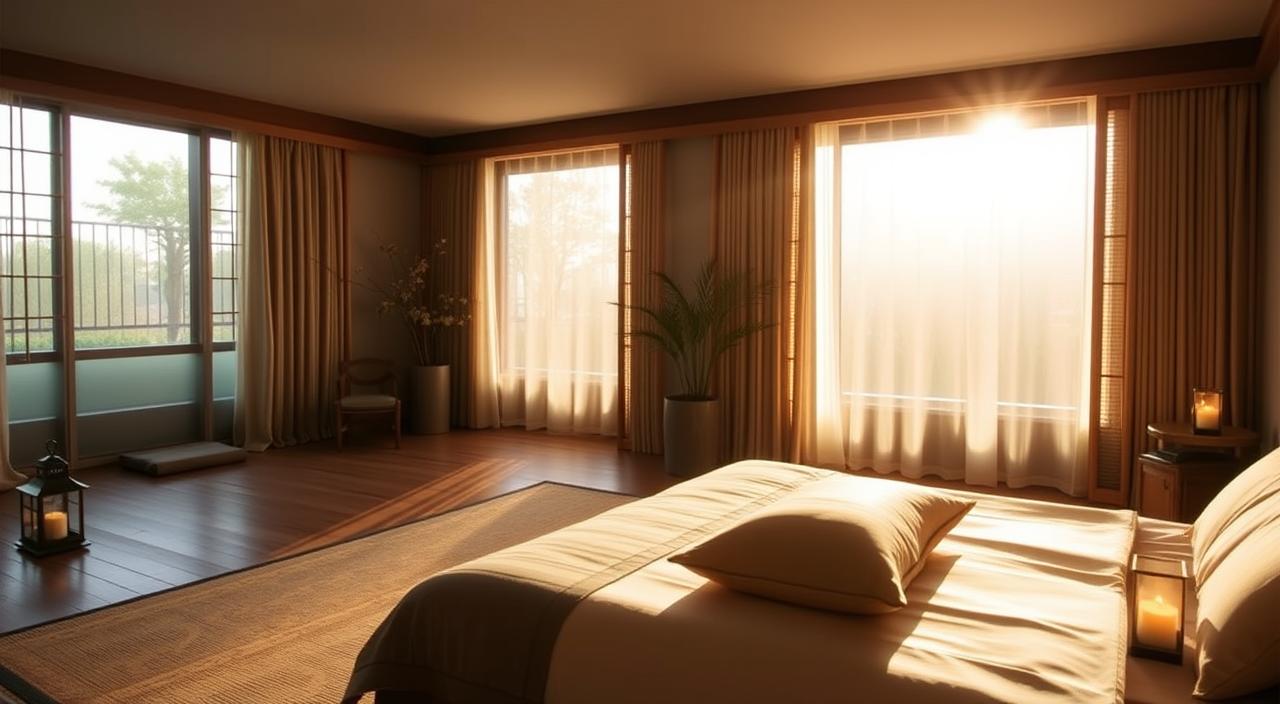
By carefully choosing lighting for your guest room, you create a harmonious space. This thoughtful lighting not only makes the room look good but also improves your guests’ well-being and comfort.
Decluttering and Organization Strategies
Decluttering and organization are crucial for a harmonious guest room. Studies show that Feng Shui layouts can enhance sleep quality. Effective storage keeps the room tidy, ensuring energy flows smoothly.
Storage Solutions
Use closets, dressers, or under-bed storage for guests’ items. A study found Feng Shui improved nurses’ mental health. Ample storage brings order and tranquility, making guests feel comfortable.
Maintaining Clear Pathways
Feng Shui and decluttering work together to refresh spaces. Keep paths clear for energy flow. The bagua map helps organize homes for better life aspects.
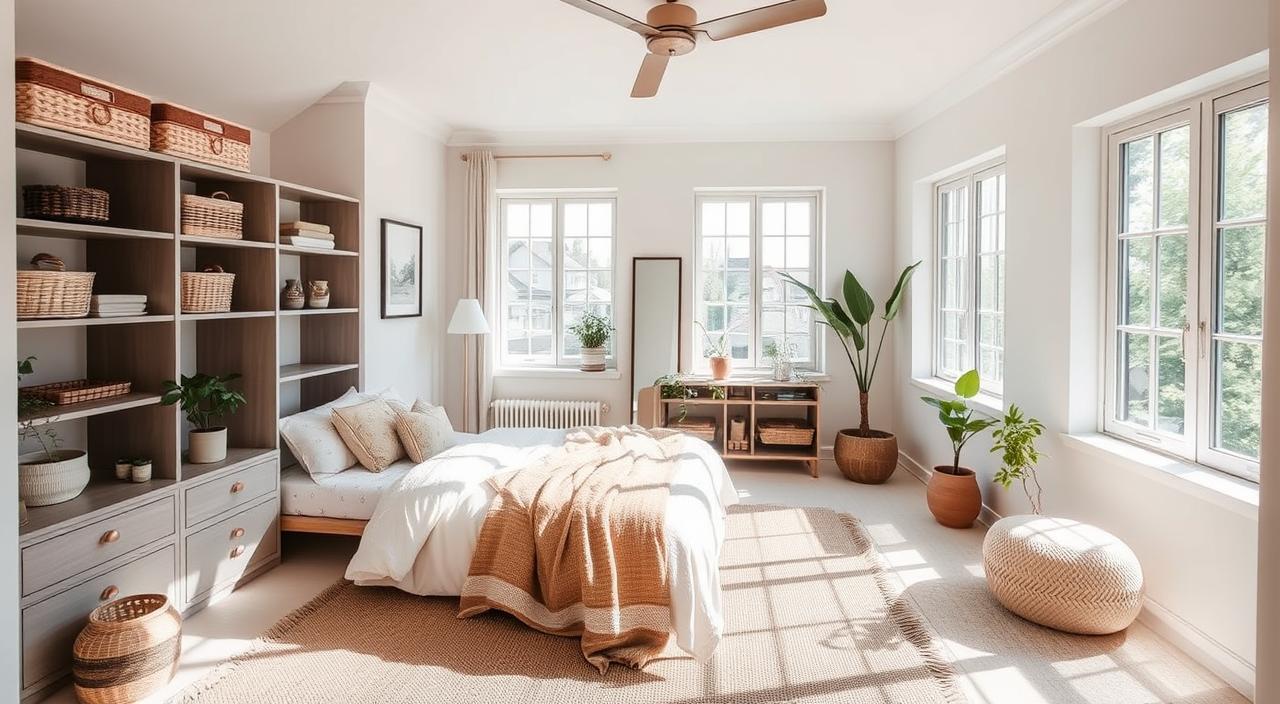
Feng Shui suggests regular decluttering for balance. Warm colors like red and yellow boost energy. It’s about keeping meaningful items and letting go of the rest.
Mirror Placement and Decorative Elements
In Feng Shui, mirrors and decorative elements play a big role in a guest room’s energy flow. Mirrors are linked to water, while Qi is connected to air. This makes their placement key for balance and harmony.
Good energy flow is vital in a home, Feng Shui says. Mirrors are especially important in certain areas. These include the dining room, kitchen, and bedroom. They should be square or rectangular and hung 4-5 feet off the ground on North or East walls.
Decorative elements should bring calm, like nature-inspired art or abstract designs. Don’t place mirrors facing the bed to avoid sleep issues. Also, mirrors shouldn’t reflect dirty or negative things, like drains or sharp corners, as Feng Shui advises.
- Mirrors associated with the water element in Feng Shui while Qi is linked to air.
- Specific areas where Feng Shui mirror placement is crucial include the dining room, kitchen, restroom/bathroom, bedroom, living room, foyer, front door, staircases, and hallways.
- Preferred mirror shapes in Feng Shui are square and rectangular for better Qi capture.
- Hanging mirrors at least 4-5 ft off the ground is recommended.
- Mirrors should be hung on North or East walls and not on West or South walls to avoid inviting negative energy.
- Mirrors reflecting dirty or negative elements such as drains, sharp corners, clutter should be avoided as per Feng Shui principles.
By following Feng Shui principles, you can make your guest room a peaceful and welcoming place. It will help in creating a space that flows with positive energy and offers a restful atmosphere.
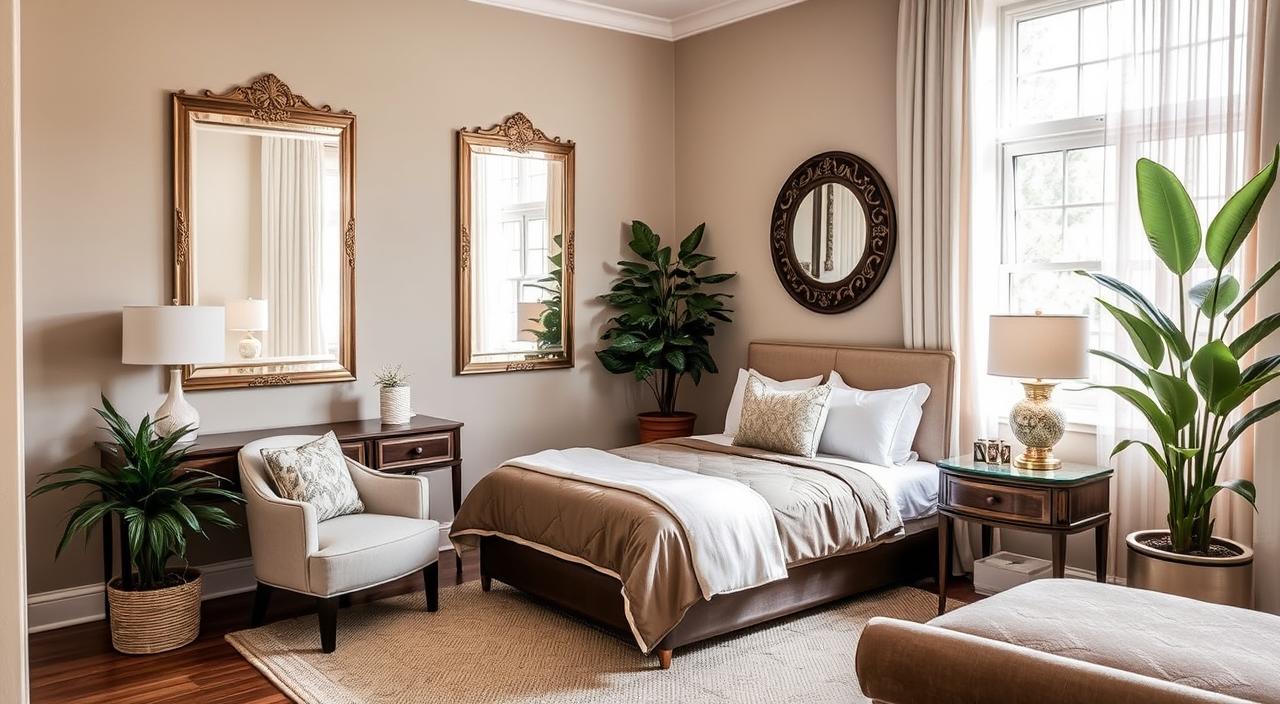
“Mirrors are not just decorative elements; they are powerful tools in Feng Shui that can greatly influence the energy of a space.”
Plants and Natural Elements in Guest Room Design
Creating a welcoming guest room involves using feng shui plants and natural materials. These elements make the space look better and feel balanced. They help make your guests feel refreshed and at ease.
Best Plants for Guest Rooms
Choose plants like pothos or peace lilies for better air quality. They add life to the room. Pick plants with soft leaves for a calming vibe.
Natural Materials Selection
Use wood, bamboo, or cotton for furniture and textiles. These materials bring a natural feel, making the room peaceful. Stay away from synthetic materials to keep energy flow positive.
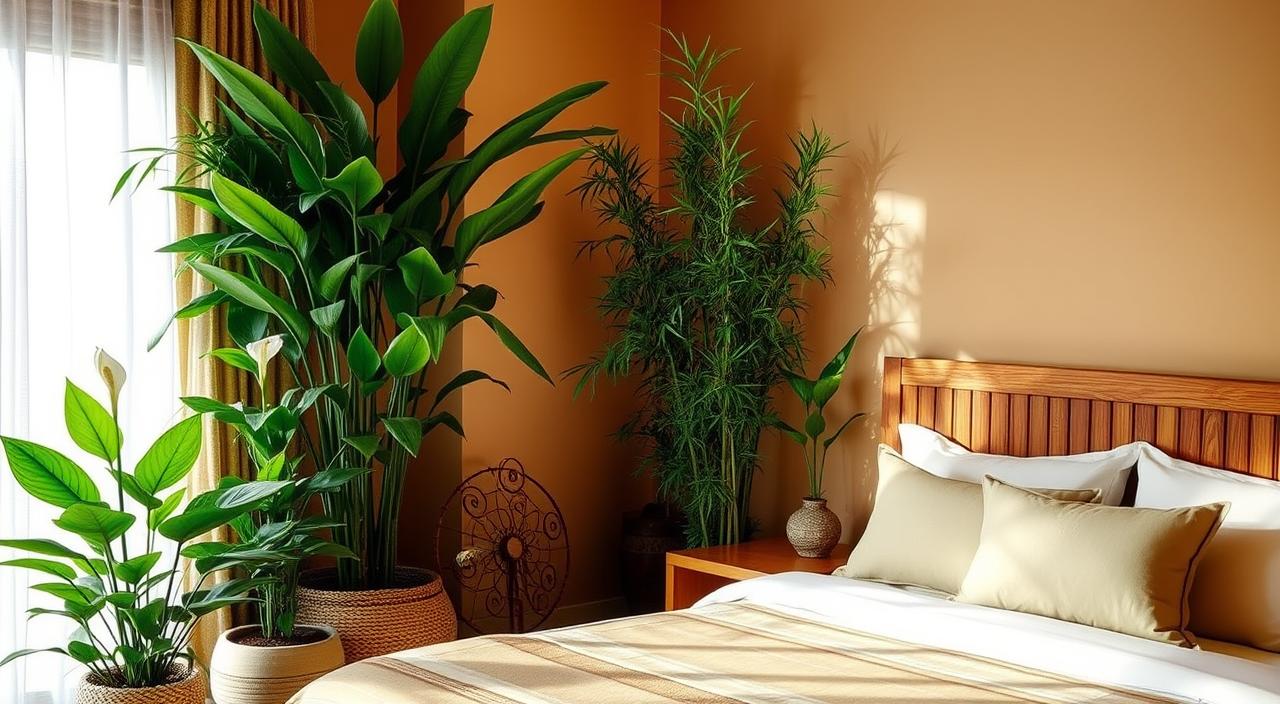
“The secret to creating a truly harmonious and welcoming guest room lies in the thoughtful integration of nature’s elements.”
By picking the right feng shui plants and natural materials, you can make your guest room a relaxing retreat. It’s a place where guests can unwind and enjoy the calm that Feng Shui brings.
Creating a Welcoming Atmosphere with Accessories
Making a guest room warm and inviting starts with the right feng shui accessories. These items not only look good but also help the room feel balanced and full of energy. By adding thoughtful touches, you can make your guests feel right at home.
Start with soft throw pillows and cozy blankets to make the room feel comfy and relaxing. Pick colors and patterns that match the five elements of feng shui – wood, fire, earth, metal, and water. This helps create a peaceful balance.
Adding practical items like a water carafe and reading materials shows you care about your guests’ needs. A small welcome gift makes the stay even more special. Use essential oil diffusers or scented candles to add calming scents and enhance the relaxing vibe.
Choosing the right feng shui accessories can make your guest room a welcoming atmosphere that your guests will remember. Every little detail in the room adds to the energy. Aim for a balance that encourages rest, relaxation, and happiness.
Common Guest Room Feng Shui Mistakes to Avoid
When setting up a guest room with Feng Shui in mind, avoid common mistakes. One big error is putting the bed where the foot faces the door. This is seen as making the room feel unwelcoming and uneasy for guests.
Another mistake is turning the guest room into a storage space or office. Feng Shui says a room should be clear and calm. Guests should feel relaxed and comfortable, not surrounded by clutter or work stuff.
Feng shui experts warn against having TVs, laptops, and phones in the guest room. These devices can mess with the room’s peaceful vibe. Also, removing personal photos and unique decor helps make the room feel more open and friendly for visitors.
FAQ
What are the key feng shui principles for creating a welcoming and harmonious guest room?
Feng shui for guest rooms focuses on balance and comfort. Place the bed right, declutter, and use soothing colors and natural materials. This helps relax and flow positive energy.
How do the five feng shui elements (wood, fire, earth, metal, water) influence guest room design?
The five elements are key in guest room design. A mix of these elements creates harmony and positive energy flow.
What is the optimal layout for a guest room according to feng shui principles?
The best layout has the bed in the commanding position. It should face the door but not be in line. Avoid beds under windows or low beams for clear energy flow.
What are the key considerations for selecting and positioning the bed in a guest room?
Choose a bed size that fits the room well. Make sure there’s enough space to move. Place it against a solid wall with a headboard for stability. Don’t put it under windows.
How does color psychology play a role in feng shui guest room design?
Color psychology is important in guest room design. Use neutral and earthy tones for relaxation. Soft pastels and muted colors are soothing. Avoid dark or stimulating colors that disrupt sleep.
What strategies can be used to create positive energy flow in a guest room?
For positive energy flow, declutter and keep paths clear. Mix soft textures with sturdy furniture. Use natural and soft artificial lighting to welcome guests.
How can lighting elements and natural light be integrated into the guest room design?
Use natural light through windows or skylights. Choose light, airy curtains for sunlight and privacy. Soft artificial lighting creates a cozy feel, avoiding harsh overhead lights.
What are some effective decluttering and organization strategies for a guest room?
Use storage solutions to keep the room tidy. Clear paths allow for energy flow. Regularly declutter and organize for a welcoming space.
How should mirrors and decorative elements be incorporated in a guest room?
Place mirrors to reflect light and make the room feel bigger. Avoid mirrors facing the bed. Choose decor that brings tranquility, like nature-inspired art.
What types of plants and natural materials are recommended for a guest room?
Add air-purifying plants like pothos or peace lilies. Use natural materials like wood, bamboo, or cotton for furniture and textiles. This creates a grounded feel.
How can a welcoming atmosphere be created with accessories in the guest room?
Choose accessories that are relaxing, like throw pillows and soft blankets. Add elements representing the five feng shui elements. Include practical items like a water carafe and a small welcome gift.
What are some common feng shui mistakes to avoid in a guest room?
Avoid placing the bed in the “coffin position” and using the room as storage or a home office. Minimize electronic devices and personal photos to make it welcoming for visitors.














